On a mission to provide sleepers with a mattress that’s as eco-friendly as it is customizable, Latex for Less has debuted its all-latex bed, which features a flippable construction built with organic materials.
While these features are certainly attractive, I’m not going to be sold on this mattress until I put it through my tried-and-true tests to figure out how it feels, how it sleeps and whether or not it could be the mattress of your dreams.
Continue reading below for my full review of the Latex for Less mattress. Don’t have time to read it all? Click here to skip to the bottom and check out my review summary.

Bouncy and 100% organic, the Latex for Less bed could be great for a wide range of sleepers. Click this button to save up to $450!
https://www.youtube.com/watch?v=ZfAwCXwQzZs
CONSTRUCTION
The Latex for Less mattress features a simple construction of just two latex layers, measuring up to a total 9” of comfort. Depending on how you choose to orient the bed, you’ll either have a 2” layer of Talalay latex (light, airy) overlaying a 6” section of Dunlop latex (firm, dense) or vice versa. The former configuration is meant to evoke a “Medium” feel while the latter is designated as “Firm.”
I should also mention that regardless of the type of latex (Talalay and Dunlop are, after all, just two different manufacturing processes), Latex for Less prides itself on sourcing its latex from a single origin spot, in this case Sri Lanka. This is generally considered to be a good thing, as Single Origin manufacturing ensures better worker treatment and a more transparent production process.
All that being said, let’s dive into these layers and see what’s going on below!
Cover – Built with organic cotton, the cover is soft and breathable. It’s also quilted with all-natural wool, which creates a gentle feel that’ll provide the sleeper with immediate comfort.
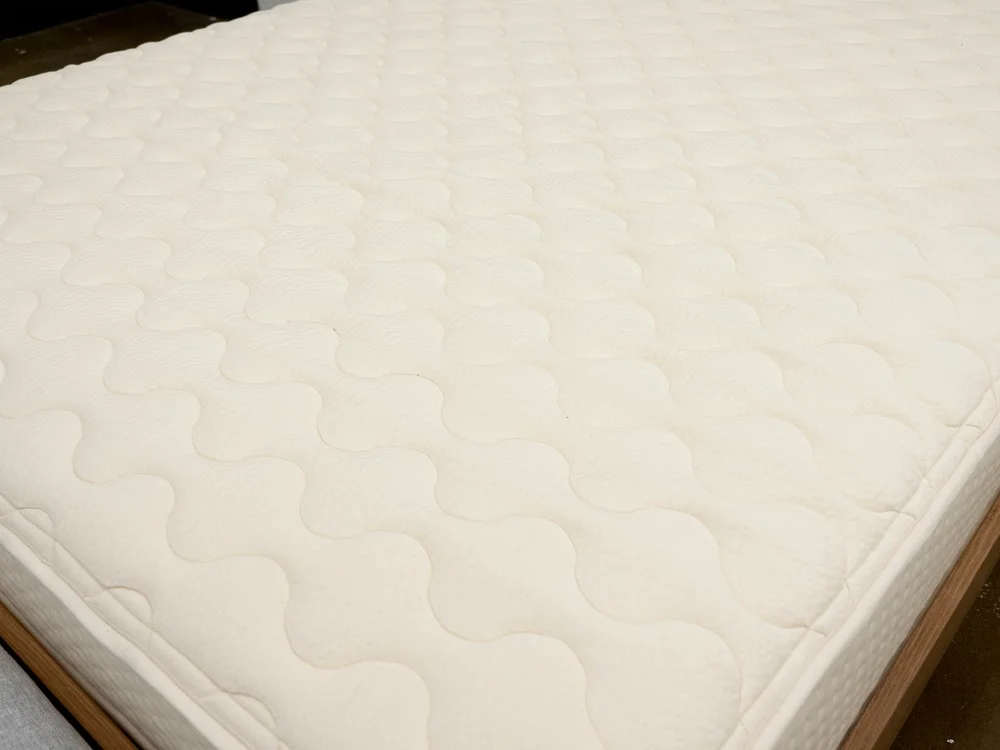
Medium Layer – As I mentioned up top, the medium layer is comprised of 2” of Talalay latex, a lightweight material that’s soft yet very responsive. While positioning this section above the Dunlop layer (as I did for this review) will allow the sleeper to sink in for some nice pressure relief, the bounce is likely to mitigate any sort of stuck-in-the-bed feeling you might feel.
Firm Layer – Made up of 6” of dense Dunlop latex, this section makes for a solid foundation when oriented below the Talalay layer. Once flipped, it becomes a firm comfort layer best suited for those who want to feel squarely positioned on top of the bed (looking at you stomach sleepers!). Regardless of the configuration, the latex is going to do a great job of keeping things cool throughout the structure.
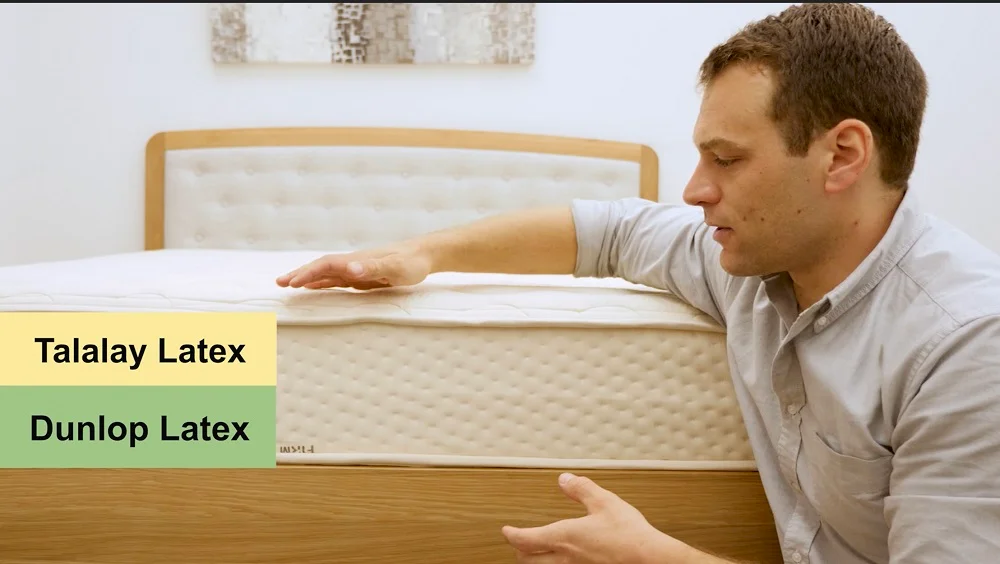
FIRMNESS

Bouncy and 100% organic, the Latex for Less bed could be great for a wide range of sleepers. Click this button to save up to $450!
After taking a look at the construction of the Latex for Less bed, let’s chat about the firmness and feel. I started off by applying light hand pressure to the mattress and found that I was immediately interacting with the gentle wool quilted into the cover. Pressing in further, my hand began to sink into the Talalay layer, though it pretty quickly bounced back up to the surface thanks to the buoyant lift of the latex construction.
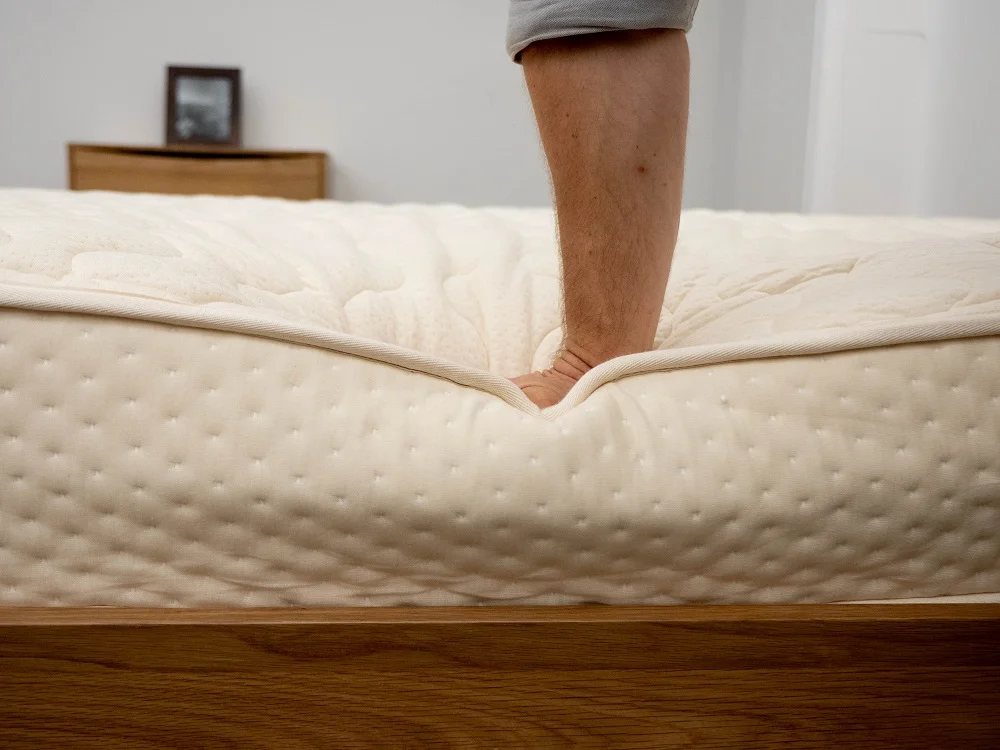
Since folks of different sizes and weights are going to feel firmness differently, I brought in three other testers to help me figure out how firm this mattress is. To do this, we each took a turn lying on the mattress and gave it a personal firmness rating. We then compiled these scores on the graph below.
While feel is always going to be an individual thing, our responses should give you a pretty good idea of the firmness range you can expect from this bed.
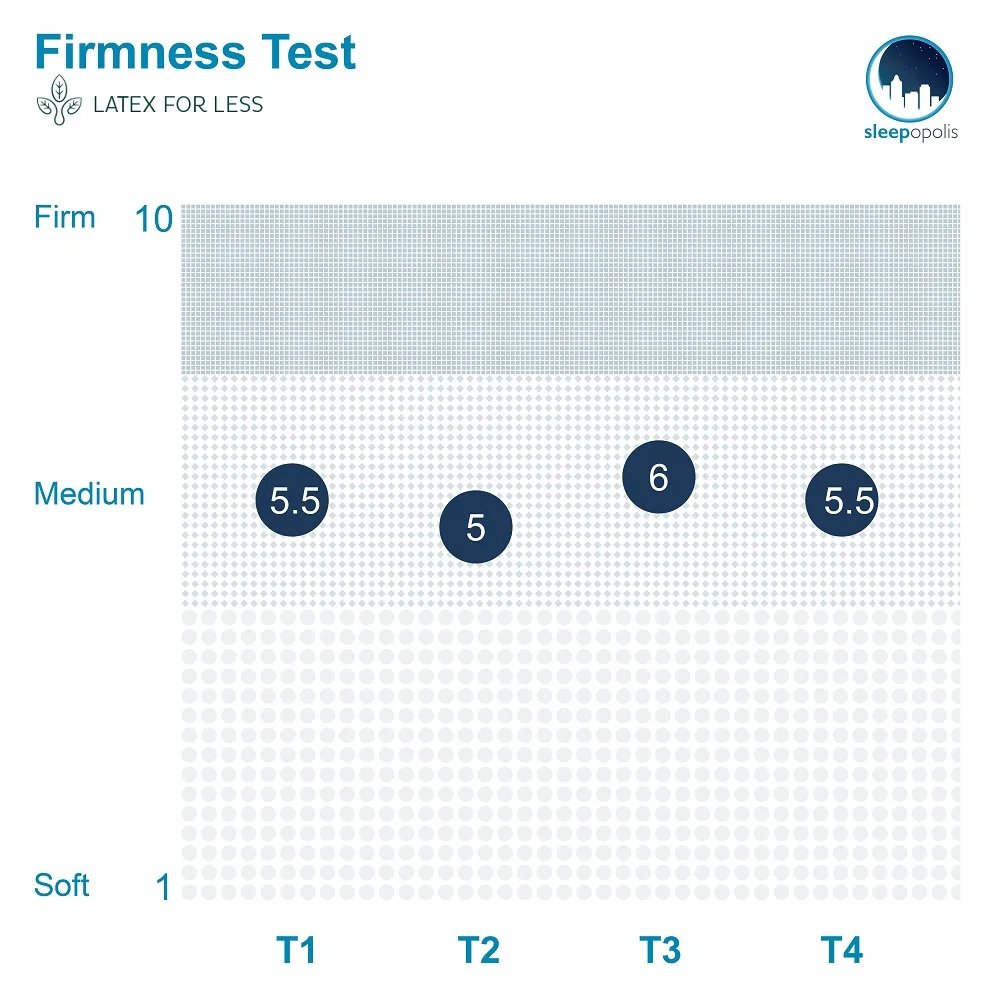
Though our responses were a bit all over the place on this one, we did land on an average firmness rating of 5.5. When compared to the industry standard of 6.5 for medium firmness, it’s clear that this bed is fairly soft.
I personally gave the bed a 5.5 as I found the combo of lightweight Talalay latex and quilted wool produced a gentle feel that allowed me to sink into the mattress quite a bit. Though this sinkage was eventually curbed by the firm Dunlop latex foundation, I still experienced the bed as having an overall soft feel.
I’ll remind you that I only looked at the mattress in the “Medium” configuration and that flipping the layers to have the Dunlop section on top would likely result in a firmer feel.
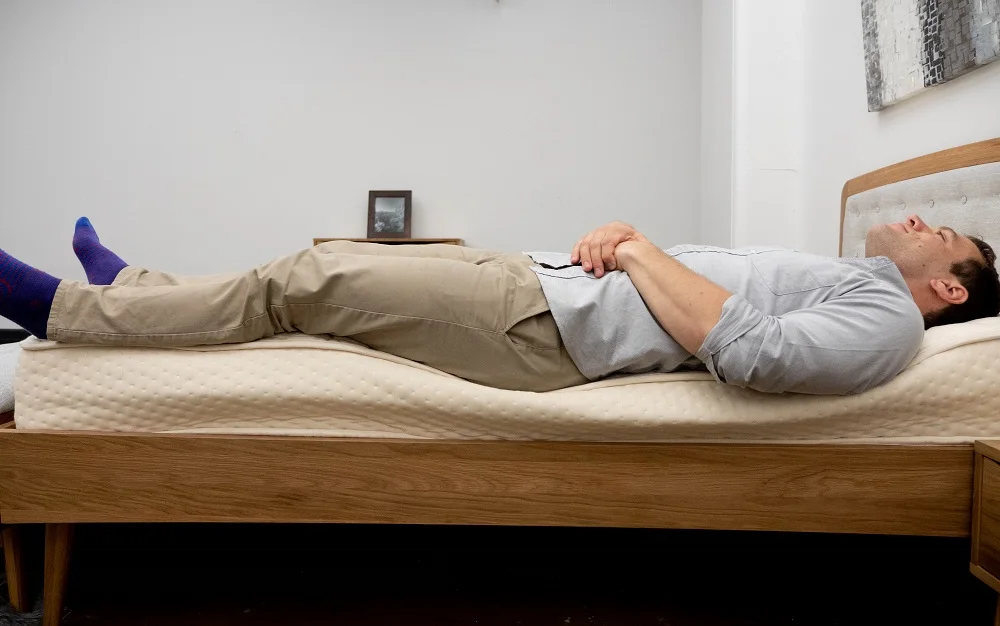
Pressure Map
When speaking about the feel of a new bed, it’s also important to take a note of pressure, or more specifically where pressure points are likely to form while lying on top of it. While I could describe where these tension spots are bound to crop up, I thought it’d be more helpful to provide you with a visual representation instead.
To do this, I placed a pressure map on top of the mattress and lied on my back, side, and stomach. You can see the results on the image below where pressure is represented from blue (low pressure) to red (high pressure).
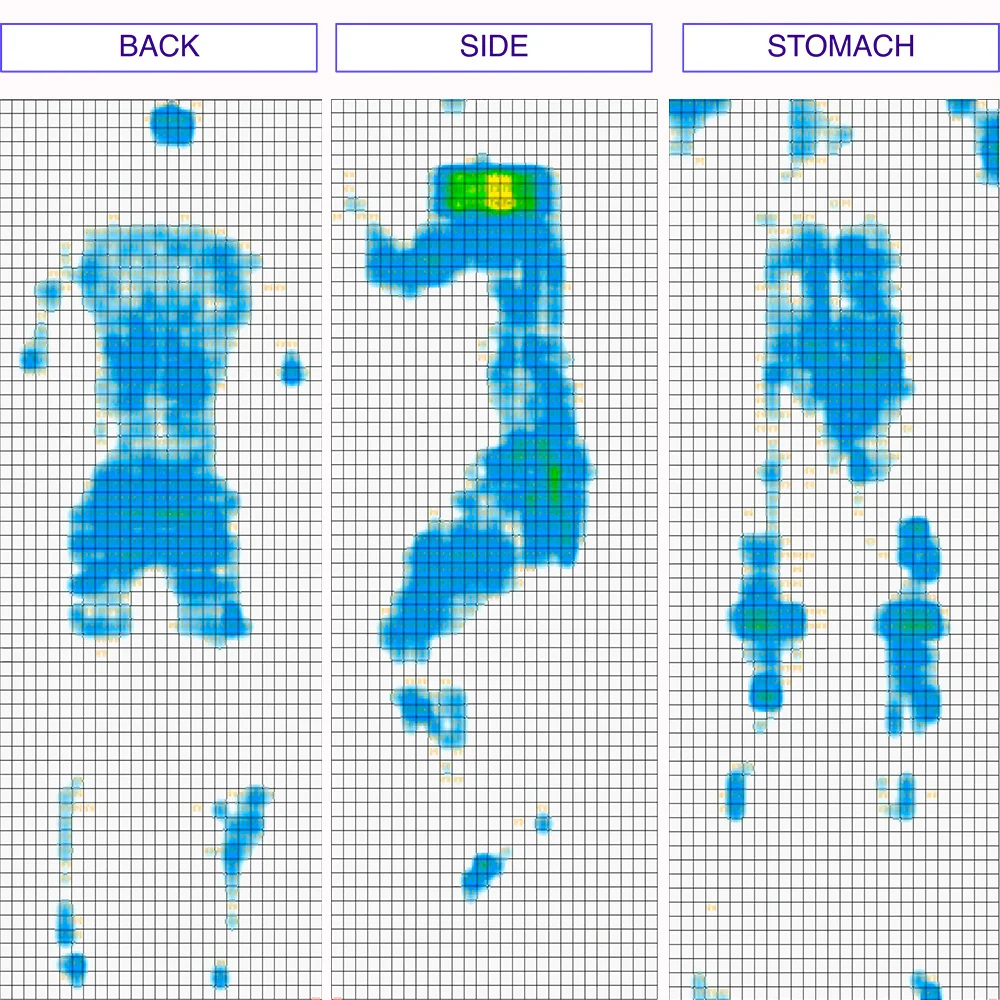
Back – Lying on my back, I could really feel myself sinking into the mattress, with the soft Talalay latex working to fill in the space at my lumbar region. In spite of this sinkage, I didn’t feel stuck in the bed and found it easy to move around and change positions.
Edge Support – Scooting closer to the side of the bed, I detected some pretty deep compression through the top layer of foam. While I didn’t feel as though I’d roll out of the structure, I wouldn’t say that I felt super secure either. What this means is that you’re not likely to be able to utilize the entire surface area of the mattress, which could be a dealbreaker for those of you looking to share the bed with a partner.
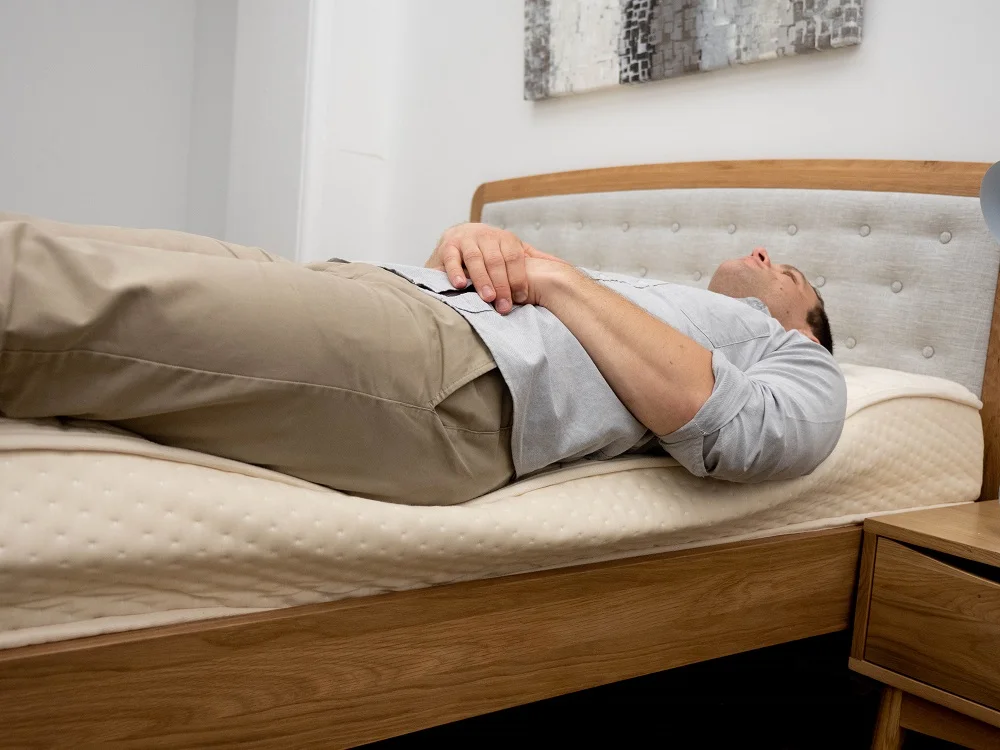
Side – Turning onto my side, I felt some solid relief at my shoulders and hips, typical problem areas for side sleepers. I’m not too surprised by this, as those who doze primarily on their sides tend to favor softer beds that allow for some nice sinkage at these sensitive spots.
Stomach – Stomach sleepers on the other hand are the opposite in that they prefer a firmer bed that keeps the spine in a nice, even line. Here, I could feel my hips sinking into the mattress, which caused them to fall out of alignment with my shoulders. I’ll reiterate that I was lying on the “Medium” orientation of the bed, so strict stomach sleepers may want to consider flipping their Latex for Less to the “Firm” side.
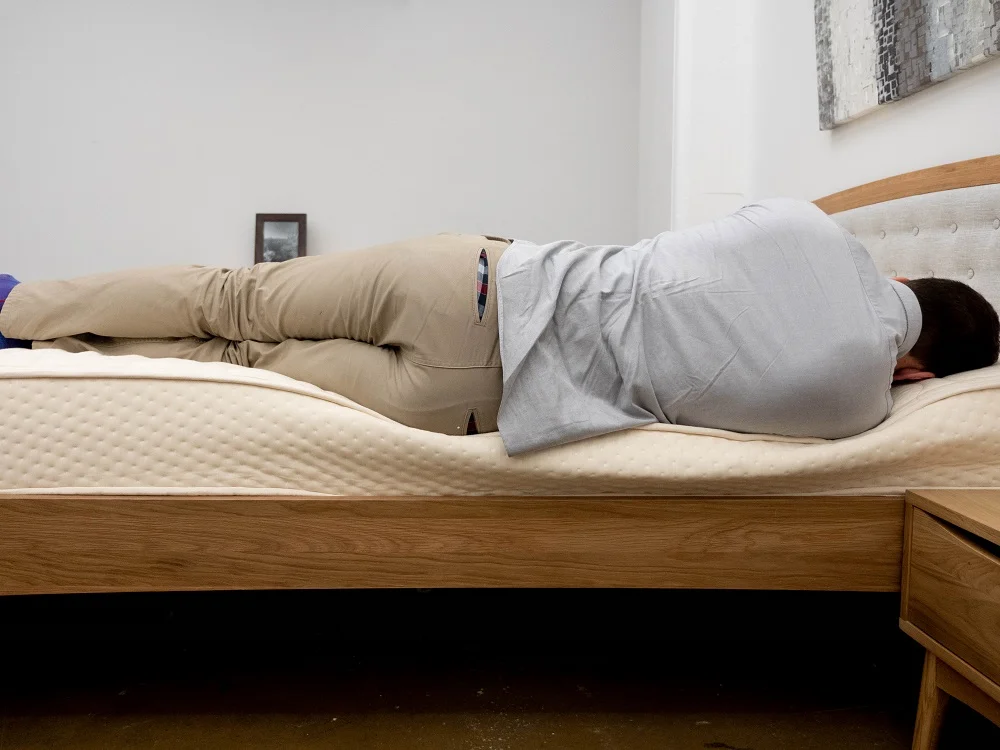

Bouncy and 100% organic, the Latex for Less bed could be great for a wide range of sleepers. Click this button to save up to $450!
MOTION TRANSFER
If you plan on sharing your bed with a partner, you’ll want to know what it’ll feel like when the other person tosses and turns in the night. This next test is intended to demonstrate just that by showing the intensity of motion detectable from one side of the mattress to the other.
To illustrate this motion transfer, I dropped a 10 lb. steel ball from heights of 4 inches, 8 inches and 12 inches and measured the disturbance it caused: the bigger the lines, the bigger the disturbance.
FYI: Each drop is meant to symbolize a different movement you’re likely to experience in bed, from tossing and turning (4”) to getting out of bed (8”) all the way to full on jumping (12”).
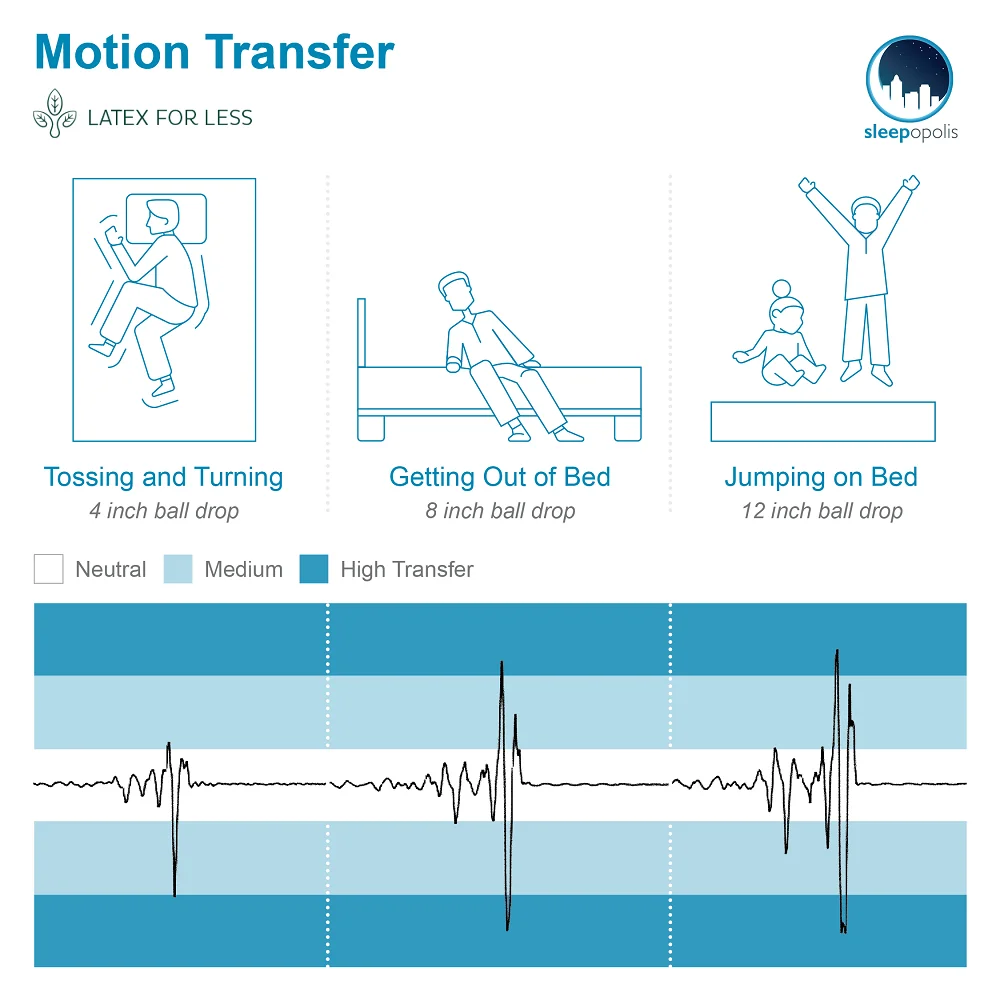
In my opinion, these results are fairly average when compared to other foam mattresses on the market, but actually pretty great when compared to other all-latex models. Since latex is such a bouncy material, beds that heavily feature it tend to suffer from major motion transfer issues, so I’d say if you’re a fan of latex and sleep with a bed mate, this could be a great pick for you!
SINKAGE TEST
When buying a new bed, most people want to know whether they’ll feel like they’re sinking “into” the mattress or laying “on top” of it. To visualize this sinkage, I placed four balls of varying sizes and densities (a 6 lb medicine ball, a 10 lb steel ball, a 50 lb medicine ball, and a 100 lb medicine ball) on the mattress and measured how much they compressed the surface.
The variations in size, weight and density are meant to simulate different body parts and different sized sleepers.
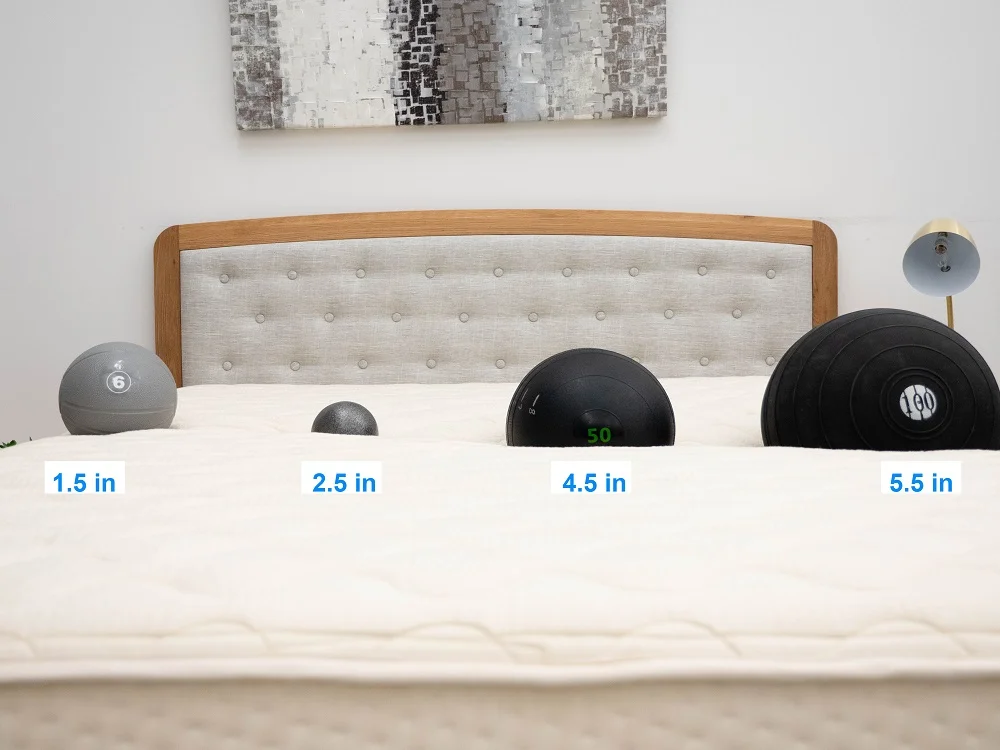
- 6 lb medicine ball: 1.5 inches of sinkage.
- 10 lb steel ball: 2.5 inches of sinkage.
- 50 lb medicine ball: 4.5 inches of sinkage.
- 100 lb medicine ball: 5.5 inches of sinkage.
Considering the short 9” profile of the bed, these are pretty dramatic results, and tell me that you’re likely to experience a lot of sinkage, especially with the Talalay latex on top. That being said, I found that the buoyant support of the material helped to lift me up and out of the structure so I didn’t feel too stuck in the mattress.
And remember that if you’re concerned about sinking in too much, you can always flip the bed to have a firmer feel.
BASIC INFORMATION
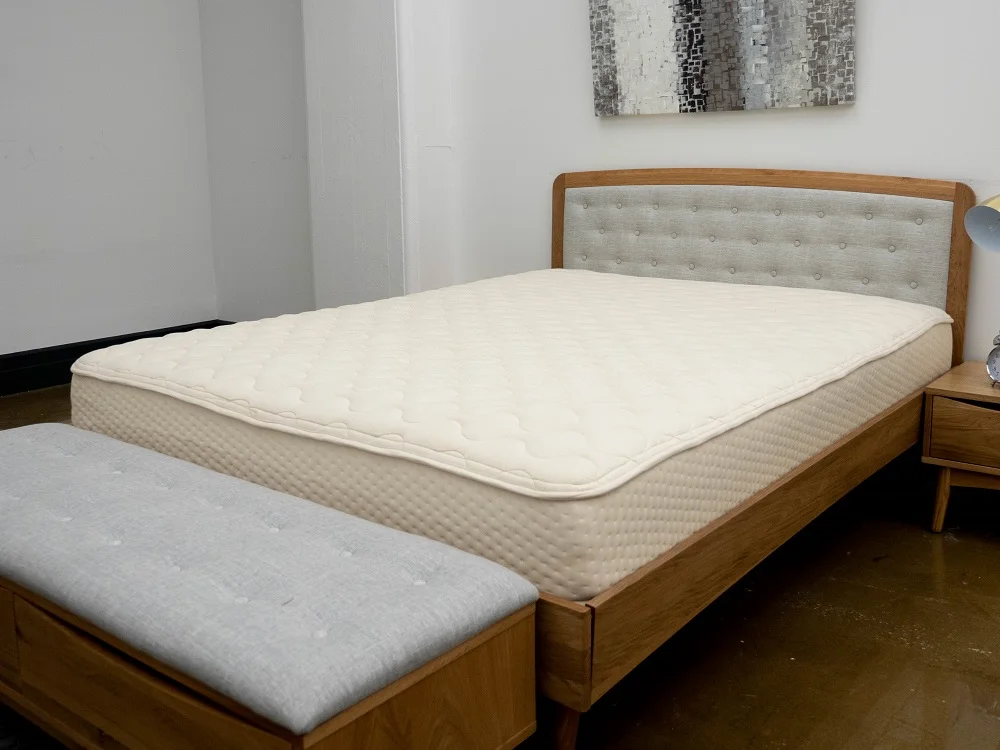
- Sleep Trial: 120 days.
- Warranty: 20 years.
- Shipping: Free, arrives compressed in a box.
Just getting started? Begin your mattress search with my mattress reviews breakdown.
SIZE AND PRICING INFORMATION
If you’re convinced the Latex for Less is the right mattress for you, the size and pricing information for the mattress are below. Please note that these prices reflect standard pricing, but you can use the code SLEEP100 to save $100 on the purchase of your Latex for Less mattress.
| Size | Dimensions | Weight | Price |
|---|---|---|---|
| Twin | 38″ x 75″ x 9″ | 59 lbs | $1,299 |
| Twin XL | 38″ x 80″ x 9″ | 63 lbs | $1,299 |
| Full | 54″ x 75″ x 9″ | 84 lbs | $1,549 |
| Queen | 60″ x 80″ x 9″ | 100 lbs | $1,549 |
| King | 76″ x 80″ x 9″ | 127 lbs | $2,049 |
| California King | 72″ x 84″ x 9″ | 126 lbs | $2,049 |
IS THE LATEX FOR LESS MATTRESS RIGHT FOR YOU?

Bouncy and 100% organic, the Latex for Less bed could be great for a wide range of sleepers. Click this button to save up to $450!
Now that we’ve taken a closer look at the Latex for Less mattress, I want to highlight some of its biggest pros and cons:
PROS
- One of my favorite features of the bed is that it’s built entirely of all-natural materials, which could be a big selling point for you eco-friendly sleepers out there.
- It also sleeps cool, thanks to its all-latex construction!
- And last but certainly not least, the mattress is also flippable, which means that you really get two beds for the price of one.
CONS
- Latex isn’t for everyone and may not be the most ideal material for those who need cushiony pressure relief, as it doesn’t offer any contouring.
- I would also say that this bed may not feature enough support for heavier sleepers, who might want to look at a mattress with springs instead.
For more information on the Latex for Less, visit its website here!
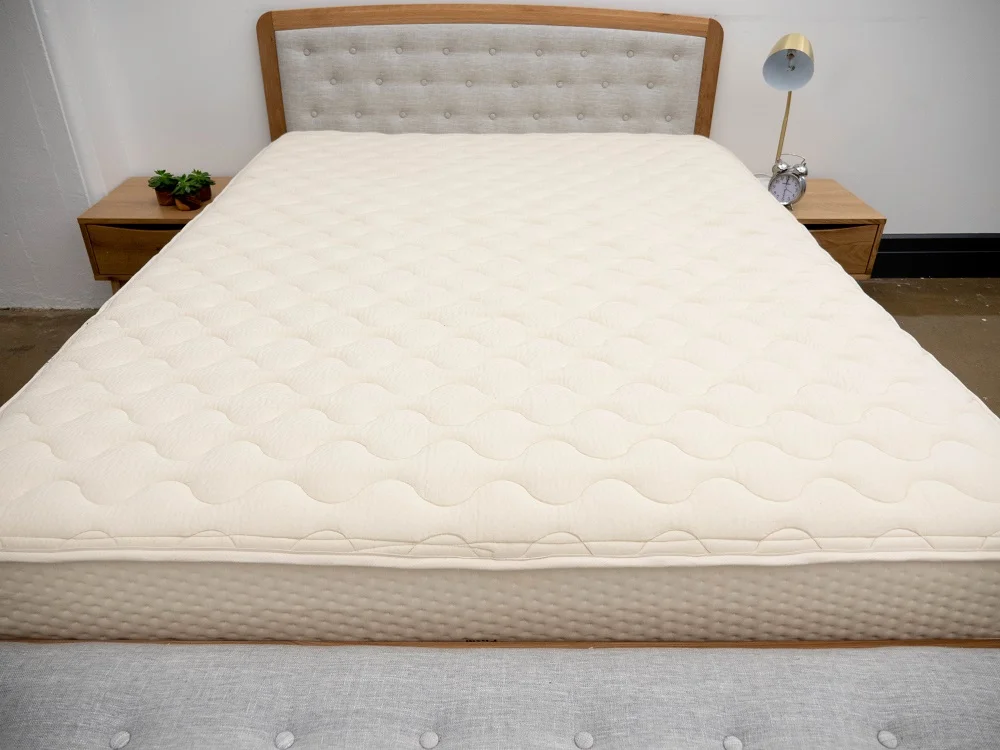
Still deciding? Take a look at our mattress performance ratings for the Latex for Less mattress below.
Latex for Less Mattress
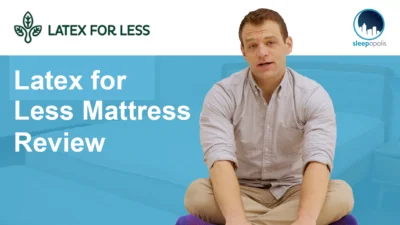
Bouncy and 100% organic, the Latex for Less bed could be great for a wide range of sleepers.
Product In-Stock: InStock
3.9

























